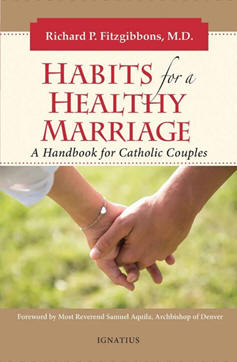Catholic Medical Quarterly Volume 70(1) February 2020
Book Review
Habits for a Healthy Marriage:
A Handbook for Catholic Couples
by Richard Fitzgibbons MD. Ignatius Press
Reviewed by Pravin Thevathasan
 The
author is a marriage and family psychiatrist with a wealth of experience.
In this wonderfully insightful work, he elaborates on the good habits that
lead to good marriages and the vices that lead to marriage breakdown. It
is a work filled with hope: marriage is seen as a noble vocation that
demands sacrifice and self-giving. This self-giving is impeded by a
variety of character flaws, including excessive anger, selfishness,
controlling behaviour, being distant, mistrust and excessive sadness.
These flaws that couples bring to their marriage can be devastating.
However, they can also be resolved. In order to gain insight, certain
often unconscious drives need to be exposed.
The
author is a marriage and family psychiatrist with a wealth of experience.
In this wonderfully insightful work, he elaborates on the good habits that
lead to good marriages and the vices that lead to marriage breakdown. It
is a work filled with hope: marriage is seen as a noble vocation that
demands sacrifice and self-giving. This self-giving is impeded by a
variety of character flaws, including excessive anger, selfishness,
controlling behaviour, being distant, mistrust and excessive sadness.
These flaws that couples bring to their marriage can be devastating.
However, they can also be resolved. In order to gain insight, certain
often unconscious drives need to be exposed.
How may one deal with excessive anger? One option is to go into denial. A better option is to communicate, to seek forgiveness, to learn to forgive. This may require coming to terms with past hurts. A controlling spouse is modelling his behaviour, perhaps unconsciously, on a controlling parent. Control may be compensation for feelings of insecurity. Perhaps the person has never come to terms with the parent who left the family. What this person has to learn is to respect the dignity and freedom of his spouse, to let go in order to bond.
The selfish spouse thinks in terms of his individual needs: it is a case of "me" rather than "we". We live in a culture than encourages selfishness. So much of secular counselling is rooted in false notions of autonomy. If the marriage is not working out for "me", then it is time to back out. The remedy here is generosity, humility and temperance. Throughout this work, the author proposes the practice of the virtues, prayer and recourse to the sacraments.
The distant spouse may be modelling his distant parent. In order to develop insight and overcome this vice, the person may need to forgive his parent as part of the healing process. An unhealthy anxiety may also lead to the person distancing himself from his spouse. An excessive preoccupation with financial matters may be overcome by the practice of the virtues.
Not only is the author a psychiatrist: he is a fully believing Catholic. Unsurprisingly, there is a synthesis of good psychology and Catholic spirituality. It is a great work by a great Catholic psychiatrist.
